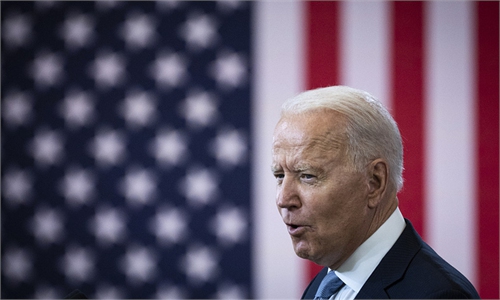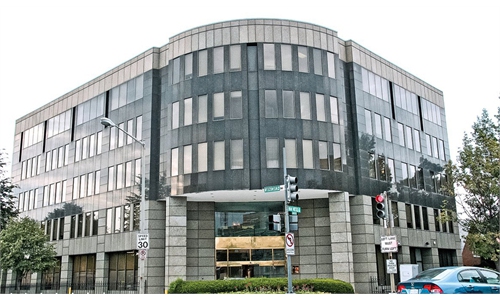
Illustration: Chen Xia/GT
For 40 years a disproportionate number of members from both parties in US Congress have dedicated political capital to inflaming a political distinction between the remote island of Taiwan and the nation of China. Congress' greatest feat was the enactment of the Taiwan Relations Act (TRA) in 1979, enabling profitable US defense industry weapons and equipment sales to the island. For continuous loyalty to that aim members enjoy a bonanza of political rewards that assist incumbency.In public, House and Senate rhetoric borders on a religious crusade, touting Taiwan island's shared values with the US and warning of a so-called grave invasion threat posed by the Chinese mainland. However, this grandstanding merely serves as cover. Congressmen and Senators are pragmatists whose time and energy must be focused on issues that guarantee reelection. In the case of Taiwan island there must be powerful incentives to fulfill a small foreign island's special interests instead of those of the broader domestic electorate.
To understand Congress' Taiwan island fixation the best start point is the 139-member, bipartisan, bicameral Taiwan Caucus. The caucus is the second largest and one of the most powerful in Congress and serves as the greatest single influence over US' China policy. The body is currently led by Representatives Gerry Connolly, Albio Sires, Mario Diaz-Balart, and Steve Chabot; as well as Senators Robert Menendez and James Inhofe. A closer look helps explain this systematic foreign interference in our representative democracy.
The Ohio and South Carolina Congressional delegations serve as good examples. Senators Sherrod Brown (OH), Lindsey Graham (SC), Tim Scott (SC), and several Representatives from both state delegations are caucus members. Except for specialized committee assignments, conduct of US foreign policy is normally a matter for the president, not members of Congress. As a plausible explanation for their Taiwan island advocacy at best one might expect the electorates of Ohio and South Carolina to reflect sizable populations of Taiwan.
Yet, only a very tiny part of residents in Ohio and South Carolina identify as hailing from Taiwan. As voting blocs their impacts on state or district election outcomes are hardly measurable. As it turns out, the island's recent strong influence over the eager Congressional delegations of those two states involved undemocratic political calculation.
Taiwan island communicated to the US State Department its desire to obtain 100 General Dynamics (GD) M1A2s tanks and 60 Lockheed Martin (LM) F-16s under TRA-enabled foreign military sales. A profit-incentivized GD identified a political opportunity for the Ohio delegation, namely expanding the M1A2 production in an armaments plant in Lima, OH. In the same fashion, LM identified a political opportunity for the South Carolina delegation by proposing an F-16 production facility in Greenville, SC.
OH and SC staffers worked closely with GD and LM lobbyists to develop business cases in advance of committee and floor votes on what is nothing less than substantial pork barrel spending. Additionally, modest campaign contributions from individual voters fall short of what incumbents require, so additional money from GD, LM, their subcontractors, lobbyists and political action committees make up the difference. While legal, such industry contributions are indistinguishable from bribes.
For production of modern weapons like the M1A2 and F-16 technologically skilled labor is required. This narrowed down the targeted electorates to citizens expected to vote. Unskilled and often poorer citizens of both states would not benefit, but Congressional staffers certainly calculated they are less inclined to vote. Now well-funded incumbent candidates with name recognition can easily sedate disadvantaged constituents by kicking the can on unfulfilled promises to the next elected period in office. The political and industry rewards for arming Taiwan are obvious, but representative democracy is completely corrupted.
These two state examples illustrate how Taiwan's secessionists opportunistically exploit the weaknesses in the characters of members of the US Congress, men and women bent on political survival. Other Taiwan island arms-related contracts are cleverly distributed throughout the US. In each case individual member and state delegation behaviors are predictably similar.
The US Congress' stated reasons for supporting Taiwan island's secession are hollow and rooted in ulterior motives. Members do not care about Taiwan island beyond its utility in serving their political ambitions. Congress already knows the US will lose a war with China over Taiwan island, but rearming after experiencing defeat will generate more good business.
Worse yet, this Congressional foreknowledge is evidence of member indifference to the tragic sacrifices of US warfighters and innocent Taiwan people in such a war. But as a price for enriching defense industry sponsors and preserving their safe seats in Congress, those sacrifices, while tragic, are acceptable along the course of their political ambitions.
The author is a retired Marine Corps infantry officer who now serves as a US civil servant in the Pentagon. Opinions are of the author and do not represent the US government. opinion@globaltimes.com.cn



